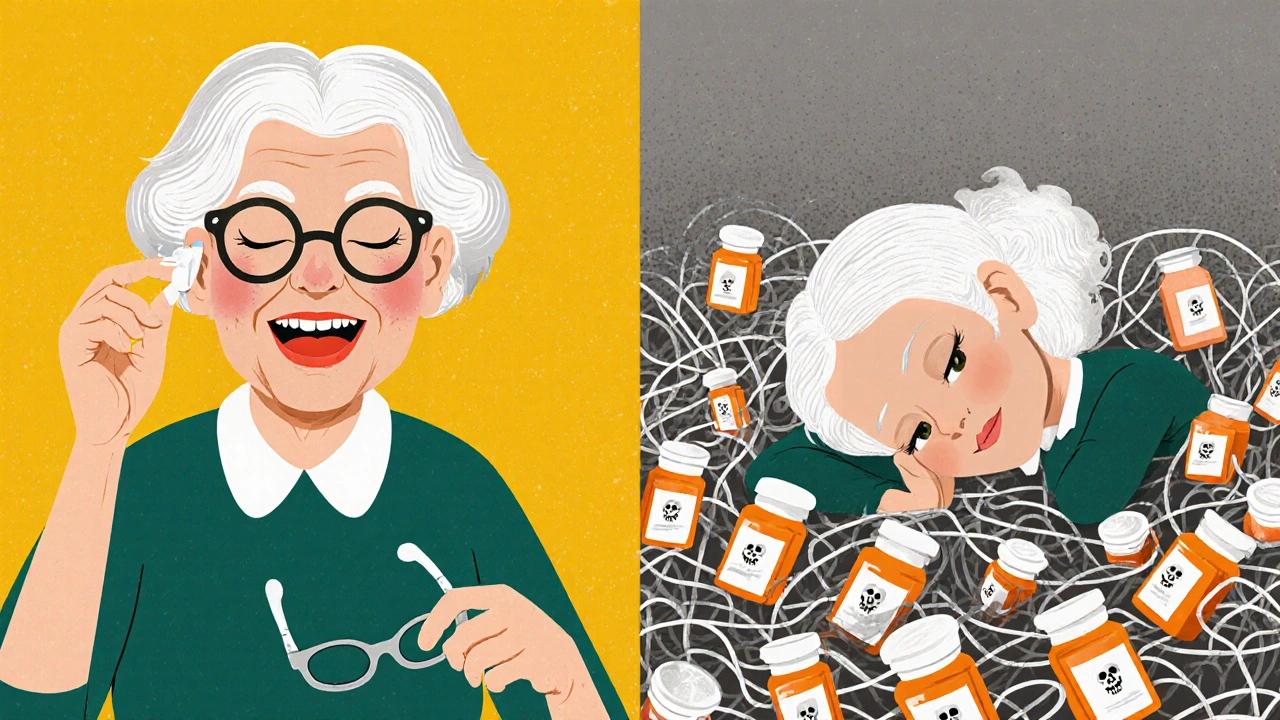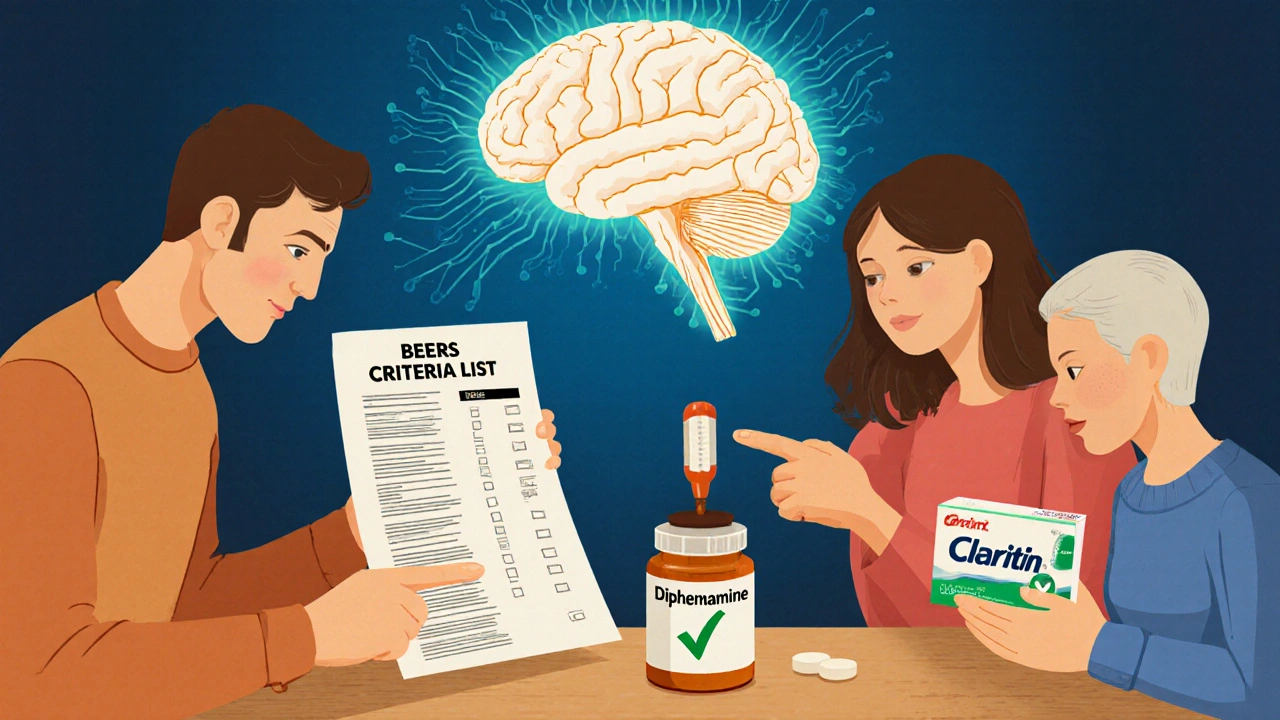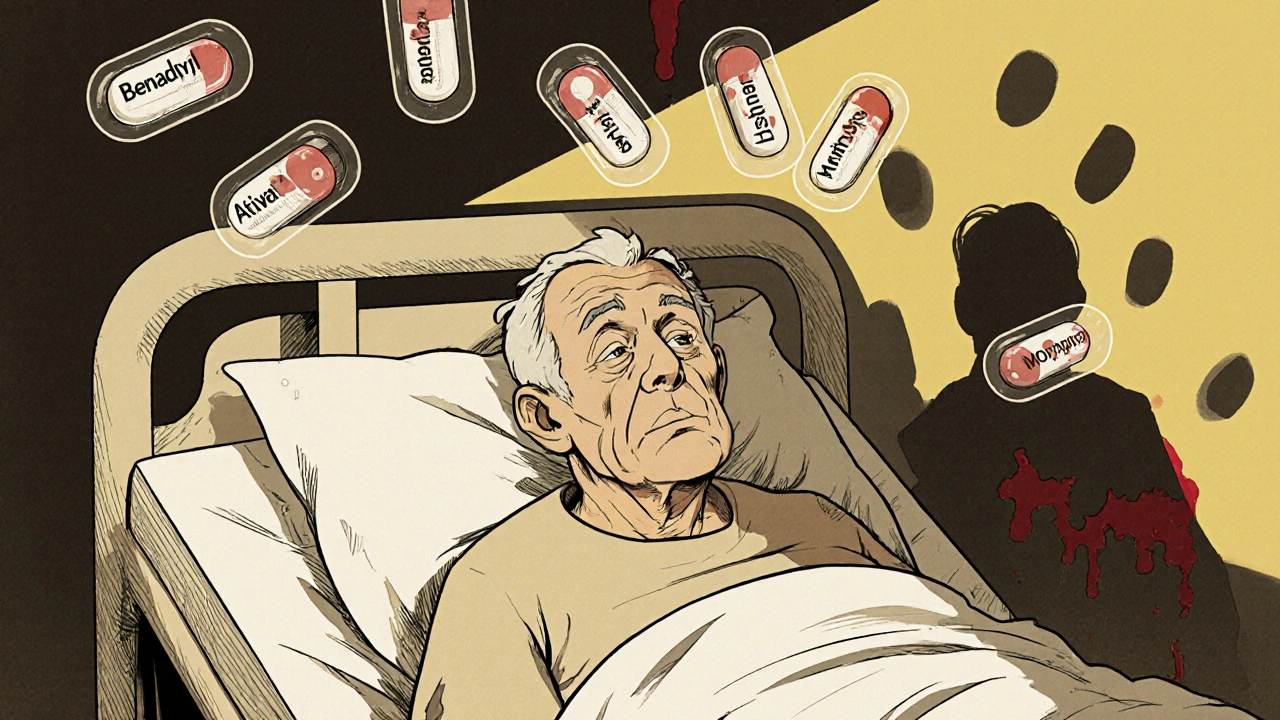What Is Medication-Induced Delirium?
Medication-induced delirium isn’t just confusion or forgetfulness. It’s a sudden, sharp change in how a person thinks, pays attention, or behaves-often starting within hours or days after starting or changing a medication. In older adults, especially those over 75, it’s one of the most common and dangerous side effects of drugs that are otherwise considered safe. Unlike dementia, which creeps in slowly over years, delirium hits fast. A person who was sharp and alert one day might be withdrawn, disoriented, or even agitated the next. And because it looks like aging or depression, it’s often missed-until it’s too late.
Why Older Adults Are at Higher Risk
As we age, our bodies process drugs differently. The liver and kidneys don’t clear medications as quickly. Brain chemistry changes too. Older brains are more sensitive to drugs that interfere with acetylcholine, a key chemical for memory and attention. Even small doses of certain medications can throw this system off balance. Someone who’s 85 is more than twice as likely to develop delirium from a medication than someone in their early 60s. And if they already have dementia, the risk jumps even higher. Delirium in these cases isn’t just a side effect-it’s a medical emergency.
Common Medications That Trigger Delirium
Not all drugs are created equal when it comes to delirium risk. Some are far more dangerous for older adults than others. The biggest offenders are:
- Anticholinergics: These block acetylcholine. Common examples include diphenhydramine (Benadryl), oxybutynin (for overactive bladder), and amitriptyline (an older antidepressant). Every extra anticholinergic drug in a person’s regimen increases delirium risk by nearly 50%. Three or more of these drugs together? That’s a 4.7-times higher chance of delirium.
- Benzodiazepines: Lorazepam (Ativan), diazepam (Valium), and similar drugs used for anxiety or sleep raise delirium risk by three times. Even short-term use in hospitals can trigger it. In ICU patients, benzodiazepines extend delirium by over two days.
- Opioids: Morphine is a known trigger. Meperidine (Demerol) is especially risky because of a toxic byproduct that builds up in older bodies. Hydromorphone is a safer alternative-it causes 27% less delirium at the same pain-relieving dose.
- First-gen antihistamines: Diphenhydramine is still widely used for allergies or sleep, but it’s 1.8 times more likely to worsen delirium than newer options like loratadine (Claritin).
The American Geriatrics Society’s Beers Criteria® lists 56 medications to avoid in older adults. Many of them are still prescribed routinely-often because doctors don’t realize the danger.
How Delirium Shows Up: The Three Types
Delirium doesn’t always look like someone is yelling or pacing. In fact, the most common form in older adults is the quiet kind:
- Hyperactive delirium: Restlessness, hallucinations, aggression, or talking nonsense. Easier to spot, but only makes up about 25% of cases.
- Hypoactive delirium: Quiet, withdrawn, sleepy, unresponsive. This is the most common-72% of cases-and is mistaken for depression, fatigue, or dementia. That’s why it’s so often missed.
- Mixed delirium: Switches between hyperactive and hypoactive states. This is the most dangerous because it’s unpredictable.
Family members often say, “They’re just not themselves.” And they’re right. One study found 89% of caregivers noticed a complete personality shift within 48 hours of starting a high-risk drug.

Why It’s So Often Overlooked
Doctors and nurses aren’t to blame-they’re overwhelmed. Only 35% of hospital staff can correctly identify hypoactive delirium. That means over 70% of cases go undiagnosed. A patient who’s quiet and doesn’t eat? They’re labeled as “just tired.” Someone who’s confused after surgery? It’s chalked up to anesthesia. But delirium isn’t normal. It’s a warning sign that the brain is under stress-and that a medication might be the cause.
How to Prevent It
The good news? Medication-induced delirium is one of the most preventable hospital complications. Here’s how:
- Review every medication. Ask the doctor or pharmacist: “Is this drug still needed? Could it be causing confusion?” Use the Anticholinergic Cognitive Burden Scale (ACB). A score of 3 or higher means high risk.
- Replace high-risk drugs. Swap diphenhydramine for loratadine. Use hydromorphone instead of morphine. Avoid benzodiazepines unless absolutely necessary-for alcohol withdrawal or seizures only.
- Use the STOPP/START criteria. This tool helps doctors identify drugs to stop and drugs to start. Hospitals using it cut delirium rates by 26%.
- Manage pain without opioids. Combine acetaminophen, ice, heat, and physical therapy. This cuts opioid use by 37%, lowering delirium risk.
- Don’t stop drugs suddenly. Abruptly stopping benzodiazepines or alcohol can cause delirium tremens. Taper slowly over 7-14 days under supervision.
- Use the CAM tool. The Confusion Assessment Method is a simple 5-minute screening tool used by nurses. Hospitals using it see 32% fewer cases.
The Hospital Elder Life Program (HELP), developed at Yale, cuts delirium by 40%. It’s not fancy-just regular movement, hydration, hearing aids, glasses, and avoiding unnecessary drugs. Simple, but powerful.
What Families Can Do
If you’re caring for an older parent or relative:
- Keep a written list of every medication, including over-the-counter pills and supplements.
- Ask: “Could this be causing confusion?” when a new drug is prescribed.
- Watch for subtle changes: less talking, not eating, staring blankly, sleeping more than usual.
- Speak up if something feels off. You know your loved one better than anyone.
- Bring the Beers Criteria® list to appointments. It’s free online. Many doctors don’t know it.
One family in Sydney noticed their 82-year-old mother started zoning out after her doctor added diphenhydramine for “sleep.” She’d been sharp for years. Within a week, she didn’t recognize her grandchildren. The pharmacist spotted the drug on her list. Within 48 hours of stopping it, she was back to herself.

The Bigger Picture
Medication-induced delirium isn’t just a medical issue-it’s a systemic failure. In the U.S., it costs $164 billion a year in extra hospital stays and long-term care. Medicare now treats hospital-acquired delirium as a “never event,” meaning they won’t pay for the extra costs. That’s pushing hospitals to act. In 2023, the FDA required stronger warning labels on anticholinergic drugs. The National Institute on Aging is funding real-time EHR alerts to flag high-risk combinations.
Still, 43% of hospitals keep prescribing these drugs. Why? Because old habits die hard. Because doctors don’t get training on delirium. Because it’s easier to write a script than to have a hard conversation.
But change is coming. AI tools now predict delirium risk with 84% accuracy by scanning medication lists. Genetic tests can spot people more vulnerable to long-lasting delirium. The tools exist. What’s missing is awareness.
Final Thoughts
Medication-induced delirium isn’t inevitable. It’s preventable. Every pill a senior takes should be questioned-not because drugs are bad, but because older bodies react differently. A simple review of medications can mean the difference between a return to normal life and a long decline. Don’t wait for confusion to become a crisis. Ask. Check. Swap. Save a mind before it’s too late.
Can medication-induced delirium be reversed?
Yes, in most cases. Once the triggering medication is stopped or changed, symptoms often improve within hours to days. The faster it’s recognized, the better the outcome. In people without dementia, recovery can be complete. For those with existing cognitive decline, it may take longer, but improvement is still likely.
Is diphenhydramine (Benadryl) safe for seniors?
No, it’s not recommended. Diphenhydramine has strong anticholinergic effects and is one of the top causes of delirium in older adults. The American Geriatrics Society advises avoiding it entirely. Safer alternatives include loratadine (Claritin), cetirizine (Zyrtec), or fexofenadine (Allegra)-all second-generation antihistamines with minimal brain effects.
What’s the difference between delirium and dementia?
Delirium comes on suddenly-over hours or days-and symptoms fluctuate throughout the day. Dementia develops slowly, over months or years, and gets worse gradually. Delirium is often reversible; dementia is not. But delirium can happen on top of dementia, making it harder to spot. If someone with dementia suddenly seems much worse, it’s likely delirium-and it’s an emergency.
Can anxiety meds cause delirium?
Yes. Benzodiazepines like lorazepam and diazepam significantly increase delirium risk in older adults. Even short-term use in hospitals can trigger it. Non-benzodiazepine options like buspirone or cognitive behavioral therapy are safer for managing anxiety in seniors.
How do I know if my loved one is experiencing hypoactive delirium?
Look for these signs: unusually quiet behavior, lack of interest in conversation, staring into space, not eating or drinking, seeming “in a fog,” or not responding when spoken to. They might seem depressed or tired, but if this is new and happened after a medication change, it’s likely delirium. Don’t assume it’s just aging.
Should I stop a medication if I suspect delirium?
Never stop a medication without talking to a doctor first. Some drugs, like benzodiazepines, can cause dangerous withdrawal if stopped suddenly. But do call the prescribing doctor immediately. Say: “My loved one started this medication and now seems confused. Could this be the cause?” Most doctors will agree to review it.
Next Steps for Caregivers
Start today. Grab a pen and write down every medication your loved one takes-prescription, over-the-counter, vitamins, herbs. Then, go to the American Geriatrics Society’s website and look up the Beers Criteria®. Cross-check each drug. If you see one flagged as high-risk, schedule a call with their doctor. Bring the list. Ask for alternatives. You’re not being difficult-you’re protecting their brain.
Delirium doesn’t have to be a silent epidemic. With awareness, simple checks, and a little persistence, we can stop it before it starts.

Comments
Shawn Sakura November 22, 2025 at 03:28
Man, I never realized how many of these meds my grandma was on. She was on Benadryl for sleep, then Adderall for her 'low energy,' and some weird bladder pill. I thought she was just getting old. After reading this, I called her pharmacist-turns out she had an ACB score of 5. We switched her to loratadine and cut the Adderall. She’s been herself again for two weeks now. I’m not saying this is easy, but it’s worth it. Don’t wait till it’s too late.
Thank you for writing this. Seriously.
Swati Jain November 23, 2025 at 08:38
Oh sweet mercy, another ‘doc didn’t read the Beers Criteria’ sob story. Let me guess-this was written by someone who thinks ‘anticholinergic burden’ is a new Netflix series. Look, I get it. Pharma’s pushing pills like candy. But let’s not pretend this is some revolutionary insight. We’ve known this since 2012. The real issue? Medicare won’t reimburse for non-pharm interventions. So guess what? They keep prescribing. It’s not ignorance. It’s economics. And until we fix that, we’re just rearranging deck chairs on the Titanic.
Florian Moser November 23, 2025 at 11:37
This is one of the most important pieces I’ve read this year. Every single point is backed by evidence, and the actionable steps are clear, practical, and life-changing. I’ve shared this with my entire family, including my aging parents. We’ve already reviewed their medication list using the ACB scale and found two high-risk drugs they no longer needed. One was a sleep aid they’d been on for seven years. Within 72 hours, their mental clarity improved dramatically. This isn’t just medical advice-it’s a call to protect the people we love. Thank you for taking the time to write this with such precision and care.
jim cerqua November 25, 2025 at 06:58
Okay, buckle up. This isn’t just about meds. This is about America’s healthcare system turning elderly people into walking pharmacy experiments. One pill for sleep. One for anxiety. One for ‘joint pain’ that’s just dehydration. One for ‘heartburn’ that’s actually acid reflux from eating processed food. And then, when they start zoning out? They get another pill for ‘depression.’ It’s a vicious, profit-driven spiral. I watched my uncle go from chess champion to a silent ghost in a nursing home-all because his doctor kept adding ‘safe’ meds. He didn’t die of old age. He died of polypharmacy. And the worst part? No one’s held anyone accountable. This isn’t a tragedy. It’s a crime.
Donald Frantz November 25, 2025 at 11:34
Let’s be real. The Beers Criteria has been around for decades. Why are we still having this conversation? Because doctors aren’t trained to question prescriptions-they’re trained to write them. And hospitals get reimbursed for treating complications, not preventing them. That’s the core problem. The data here is solid, but it’s not new. What’s new is that AI can now predict delirium risk with 84% accuracy. So why aren’t hospitals integrating this into their EHRs? Because it would reduce revenue. This isn’t about awareness. It’s about incentives. And until the system changes, this will keep happening.
Sammy Williams November 25, 2025 at 14:50
My aunt was on Benadryl for years. I didn’t even know it was a problem until I read this. We swapped it for Zyrtec and she started talking again-like, actually remembering our names and asking about my job. I cried. I didn’t think it was that easy. Also, I printed out the Beers list and stuck it on the fridge. Now my whole family checks meds before we even think about giving something to my grandma. Small steps, big impact. Thanks for the clarity.
Julia Strothers November 27, 2025 at 00:48
Let’s not pretend this is about health. This is a government plot to control the elderly. Who benefits from making seniors confused? The nursing homes. The pharmaceutical conglomerates. The FDA. They want you dependent. That’s why they keep pushing these drugs. They know if you stop the meds, people wake up-and then they’ll ask questions. Like why their Medicare Part D only covers the dangerous stuff. Why their doctor never mentioned alternatives. Why their loved one’s ‘dementia’ vanished after one pill was pulled. This isn’t medicine. It’s social engineering. And they’re counting on you to stay silent.
Erika Sta. Maria November 28, 2025 at 21:19
Wait, so you’re saying anticholinergics cause delirium? Newsflash: everything causes delirium. Even sunlight. Or gravity. Or the sound of a microwave beeping. I mean, if you think one pill is the problem, you’re ignoring the metaphysical burden of modern existence. The real delirium is believing we can fix complex aging with a checklist. We’re not machines. We’re consciousness trapped in decaying meat. The meds are just symptoms. The disease is industrial capitalism. Also, I think the Beers Criteria was written by someone who hates fun. And also, I once took a Zyrtec and felt my soul leave my body. So maybe all meds are bad. Maybe we should just go live in a cave. 🌿
Nikhil Purohit November 30, 2025 at 14:19
My dad was on lorazepam after his hip surgery. He got quiet, didn’t eat, just stared. We thought it was pain or depression. Then I read this. We called his doctor, asked about alternatives, and switched to gabapentin. Within 36 hours, he was cracking jokes again. He didn’t even know he’d been gone. I’m just glad we caught it. This isn’t rocket science. It’s about listening-to the patient, to the family, to the signs. And yeah, maybe we need better training. But we also need to stop assuming ‘old’ means ‘inevitable decline.’ It doesn’t. Not always.